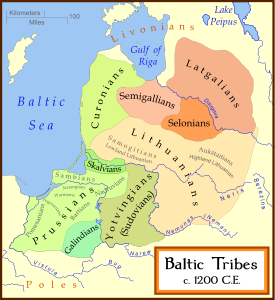
Skomantas of Sudovia
Encyclopedia

Paganism
Paganism is a blanket term, typically used to refer to non-Abrahamic, indigenous polytheistic religious traditions....
priest of the Sudovians/Yotvingians
Yotvingians
Yotvingians or Sudovians were a Baltic people with close cultural ties to the Lithuanians and Prussians...
, one of the early Baltic tribes (according to historian S. C. Rowell and some other researchers, this duke of Sudovia seems to be identical to Skalmantas
Skalmantas (Gediminids)
Skalmantas or Skolomend is the name of a possible ancestor of the Gediminid dynasty. In 1975 historian Jerzy Ochmański noted that Zadonshchina, a poem from the end of the 14th century, contains lines in which two sons of Algirdas name their ancestors: "We are two brothers – sons of Algirdas, and...
, the supposed progenitor of Gediminas' dynasty). He was at the height of his power during the 1260s and 1270s.
Skomantas is first mentioned by Peter von Dusburg during the Great Prussian Uprising (1260–1274) as a leader of the 1263 raid on Chełmno, a stronghold of the Teutonic Knights
Teutonic Knights
The Order of Brothers of the German House of Saint Mary in Jerusalem , commonly the Teutonic Order , is a German medieval military order, in modern times a purely religious Catholic order...
. He also led campaigns against Pinsk
Pinsk
Pinsk , a town in Belarus, in the Polesia region, traversed by the river Pripyat, at the confluence of the Strumen and Pina rivers. The region was known as the Marsh of Pinsk. It is a fertile agricultural center. It lies south-west of Minsk. The population is about 130,000...
and other Slavic territories and therefore could not fully support the uprising. After the uprising Skomantas, with help from Lithuanians
Lithuanians
Lithuanians are the Baltic ethnic group native to Lithuania, where they number around 2,765,600 people. Another million or more make up the Lithuanian diaspora, largely found in countries such as the United States, Brazil, Canada, Colombia, Russia, United Kingdom and Ireland. Their native language...
, led 4,000 men against the Teutonic Knights
Teutonic Knights
The Order of Brothers of the German House of Saint Mary in Jerusalem , commonly the Teutonic Order , is a German medieval military order, in modern times a purely religious Catholic order...
. However, the Old Prussians
Old Prussians
The Old Prussians or Baltic Prussians were an ethnic group, autochthonous Baltic tribes that inhabited Prussia, the lands of the southeastern Baltic Sea in the area around the Vistula and Curonian Lagoons...
and other Balts were losing their power. Skomantas' estate was devastated in 1280-1281 and he escaped with three sons, Rukals, Gedetes and Galms, to Black Ruthenia
Black Ruthenia
Black Ruthenia, Black Rus or Black Russia are variant conventional terms used for a region around Navahrudak , in the western part of contemporary Belarus on the upper reaches of the Neman River for the time period between the 13th and 14th centuries...
, controlled at that time by the Grand Duchy of Lithuania
Grand Duchy of Lithuania
The Grand Duchy of Lithuania was a European state from the 12th /13th century until 1569 and then as a constituent part of Polish-Lithuanian Commonwealth until 1791 when Constitution of May 3, 1791 abolished it in favor of unitary state. It was founded by the Lithuanians, one of the polytheistic...
. However, he soon returned, was baptized in the Roman Catholic rite, and acknowledged the superiority of the Knights. Skomantas went on to lead armies on behalf of the Knights and was awarded lands within Prussia
Prussia
Prussia was a German kingdom and historic state originating out of the Duchy of Prussia and the Margraviate of Brandenburg. For centuries, the House of Hohenzollern ruled Prussia, successfully expanding its size by way of an unusually well-organized and effective army. Prussia shaped the history...
. His tribe lost the fight against the Knights and did not survive as an entity.

